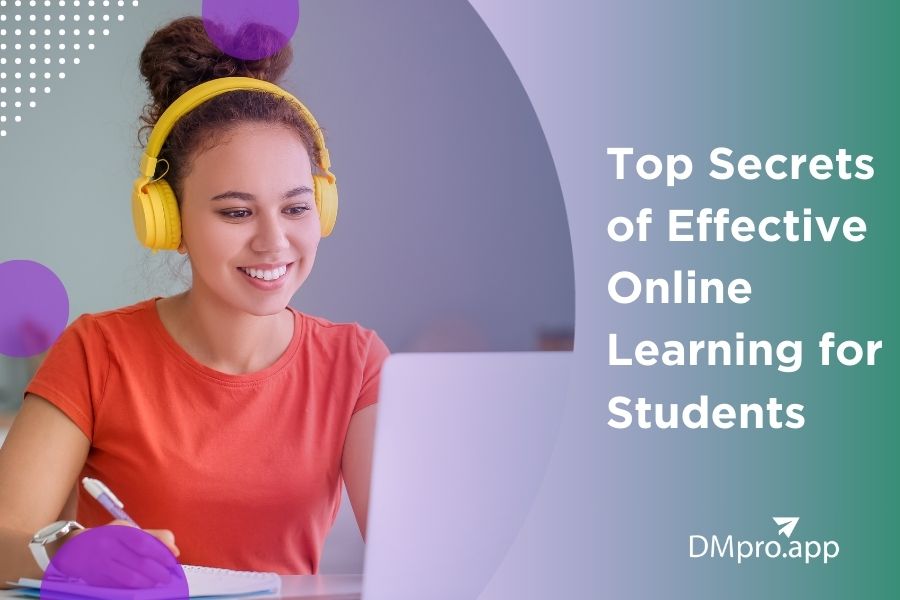Online learning for students provides unparalleled flexibility and accessibility; but, success in this environment demands purposeful methods, discipline, and self-awareness.
Here’s an in-depth guide based on psychological research, expert advice, and effective suggestions to help students reach their maximum potential through educational apps.
Table of Contents
TogglePsychology of Online Learning for Students Success
According to psychological studies, online learning for students is more than just a shift in location; it is a transformation in how we receive and remember information. Virtual learning environments need greater self-discipline and engagement than regular classes.
“Online learning for students allows them to manage their time more flexibly but also demands greater personal accountability,” says Henrique Bertulino, an education expert. “Without structured schedules, learners must adopt strategies to stay organized, set realistic goals, and maintain motivation to ensure long-term success in their academic pursuits.”
Key Psychological Factors of Online Learning for Students
- Self-regulation is the capacity to, in pursuit of long-term objectives, control your behavior, emotions, and thoughts. Self-regulated students often set precise goals, create strategies to reach them, and monitor their development, according a study that was written up in the Journal of Educational Psychology. Students who track their weekly study hours and change their behaviors depending on achievement, for instance, often outperform those who do not.
- Intrinsic motivation refers to an internal desire to study that is driven by curiosity or personal interest rather than external rewards such as grades. Dr. Edward Deci, a pioneer in motivational psychology, believes that students who focus on mastery and personal improvement have higher levels of engagement and knowledge retention.
According to Dr. Angela Duckworth, linking course materials to students’ specific interests helps them to boost their natural drive. If you study statistics, for instance, think about using them in an area of interest, such environmental science or sports.
Setting Up Your Environment for Success
The environment in which you learn has a direct impact on your productivity. A crowded workplace, bad lighting, or frequent interruptions can all impair your ability to concentrate and retain information effectively.
Must-Have Features of a Productive Study Space:
- Ergonomic setup: Spending hours in an uncomfortable chair can induce physical pain that would affect your capacity to focus. To prevent neck discomfort, select an adjustable chair and maintain eye level view of your screen.
- Natural Light: Research indicates that natural light boosts mood and cognitive performance. If natural light is unavailable, utilize warm artificial lighting to simulate daylight.
- Minimal Clutter: Keeping your workstation clutter-free eliminates mental distractions. Use organizers, trays, or folders to keep your stuff organized.
Optimal Study Space Checklist
| Feature | Why It Matters | Tips for Implementation |
| Ergonomic Setup | Reduces fatigue and increases focus | Use a chair with lumbar support |
| Natural Lighting | Boosts mood and concentration | Place your desk near a window |
| Noise Reduction | Minimizes distractions | Invest in noise-canceling headphones |
| Organized Materials | Saves time and reduces stress | Use color-coded folders or bins |
Strategies for Maintaining Focus
Working online sometimes just requires a click to get distracted. Task switching—that is, moving between unrelated activities—has a notable detrimental effect on efficiency and cognitive ability, according to study by Stanford University.
Advice on Keeping Focus:
- Establish a routine.
Begin your study sessions at the same time every day to prepare your mind for focused learning. For example, set aside two hours each morning completely for schoolwork. - Eliminate digital distractions.
Distracting websites such as social media or video platforms can be blocked during study sessions with tools like Freedom or StayFocusd. These apps decrease the desire to multitask.
For those navigating complex assignments, on research paper writing services, a research paper writing service like Studybay operates online to provide reliable assistance, making it easier to meet academic goals with the help of trusted writing companies.
- Use the Pomodoro technique.
Work in 25-minute intervals, followed by a 5-minute break. This strategy educates your brain to stay focused and minimizes burnout.
Common distractions and how to avoid them:
- Social Media: Temporarily disable notifications or utilize blocking apps.
- Household Noise: Use white noise devices or relaxing background music.
- Multitasking: Aim to do one task at a time for best efficiency.
Expert-Backed Tips for Time Management
Successful online learning for students requires effective time management. Poor preparation frequently leads to last-minute cramming, poorer-quality work, and higher stress. Dr. Laura Vanderkam, a productivity guru, highlights the value of planning your day around your energy peaks.
Practical Time Management Techniques in Online Learning for Students:
- Prioritize Tasks
The Eisenhower Matrix is a prominent method for categorizing jobs as urgent, non-urgent, important, or non-important. Concentrate on what is both urgent and vital first. - Use time blocks
Set aside certain periods for duties such as attending lectures, completing homework, and leisure activities. For example, allocate the mornings to intensive work and the afternoons to collaborative tasks. - Utilize Technology
Google Calendar, Trello, and Asana are effective tools for planning and tracking progress. To avoid feeling overwhelmed, break down your work into smaller, more achievable actions. - Set Micro Goals
Break down enormous projects into smaller milestones. For example, if you have a 10-page essay, plan to write two pages per day rather than racing through it in one session. - Regularly review your schedule
Spend 10 minutes on Sundays reviewing what worked during the week and revising your plan accordingly.
Importance of Active Learning
Passive learning, such as simply listening to lectures or reading slides, frequently results in poor knowledge. Students who actively engage with the course retain and apply information more successfully. Developing strong dissertation writing skills not only enhances academic success but can also be transformed into business success by leveraging these skills for consulting, research, or writing services in professional settings.
Active Learning Technique:
- Summarize Key Points.
At the end of each study session, summarise what you learned. This strengthens memory and clarifies ideas. - Ask questions.
Interact with your professors or peers by asking clarifying questions. Use forums, discussion boards, and virtual office hours. - Teach someone else.
Explaining what you’ve learnt to someone else is an effective technique to strengthen your understanding.
Coping With Stress and Burnout
The lack of physical borders between employment, study, and home life makes online learners especially vulnerable to burnout. Dr. Christina Maslach, a renowned burnout expert, believes chronic stress is a big contributor. Without sufficient recovery, students may experience decreased productivity and mental tiredness. Reliable online help services can alleviate the pressure by providing timely support with academic tasks, allowing students to focus on self-care and essential priorities.
Stress-Relieving Tips:
- Practice mindfulness.
Spend five minutes a day focusing on your breathing or utilizing mindfulness applications such as Calm or Headspace. This decreases anxiety and improves concentration. - Exercise regularly.
Physical activity increases endorphins, elevates mood, and improves cognitive function. A 20-minute walk can have a significant effect. - Take breaks.
Include regular brief breaks in your study schedule. You can use them to hydrate, stretch, or just rest.
Conclusion: The Formula for Success
Online learning for students is a talent in itself, requiring meticulous planning, self-awareness, and consistent effort. You may succeed in the virtual classroom and beyond by creating a productive environment, properly managing your time, and actively engaging with course material.
Remember that success in online education is a process. Begin small, make incremental improvements, and celebrate your accomplishments along the way.


